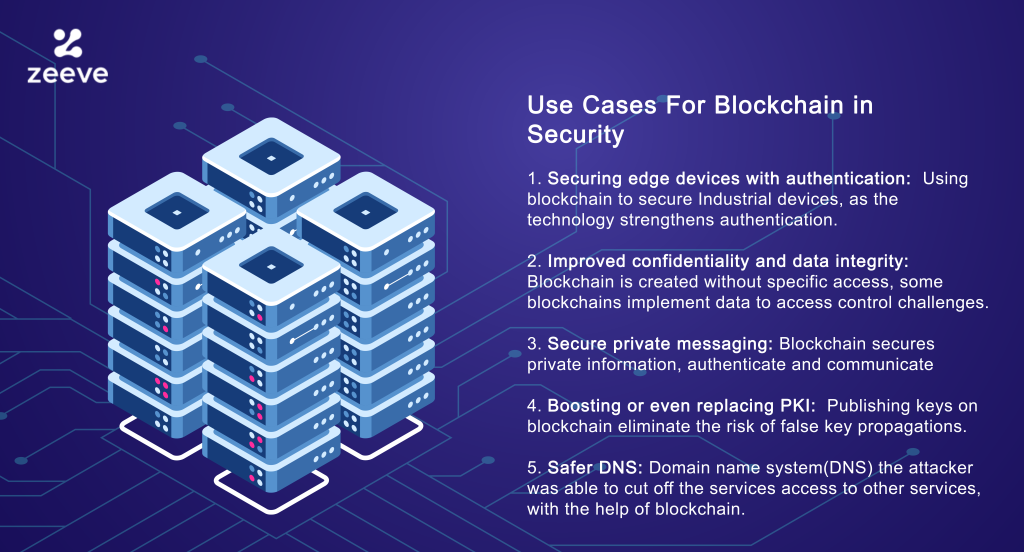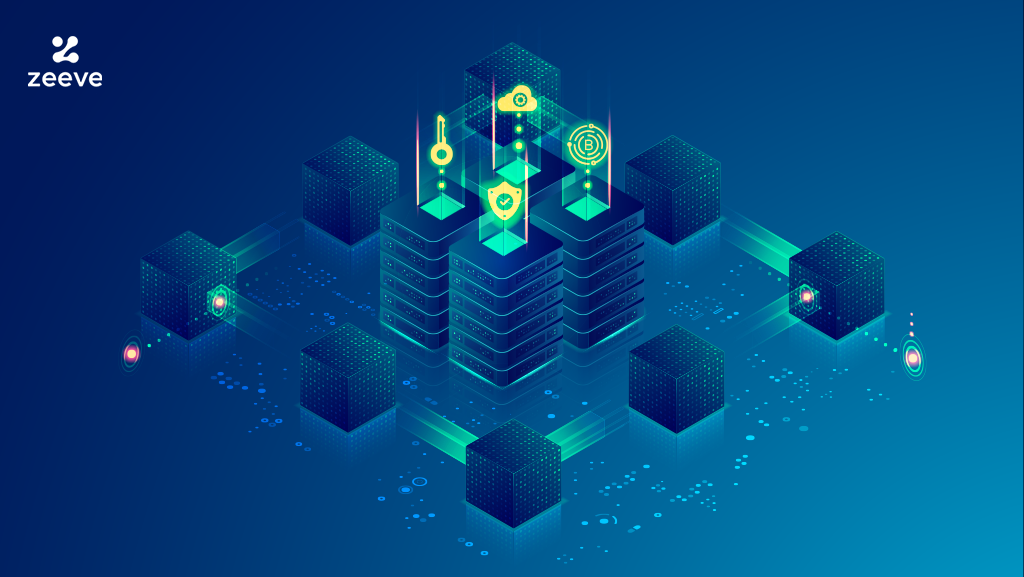Blockchain technology has gained a lot of traction in recent years, but blockchain technology and personal privacy and information security laws have developed separately. Stricter global data protection norms with greatly increased penalties have compelled businesses to reevaluate their privacy practices. There exists a lot of ambiguity and complexity right now for corporations in proceeding with blockchain technology and associated personnel in relation to data privacy requirements. If you are worried about your data security then blockchain could help. In this blog topic, we would uncover how blockchain supports data privacy and how concerns relating to privacy can be resolved effectively.
Blockchain technology helps safeguard the data from manipulation and thus increases data security. The data is saved in a redundant and distributed storage of multiple nodes in the blockchain, which is transparent and immutable. It makes it essential for a blockchain project to examine the data for storage and whether we can consider that data as personal data.
What is data privacy?
Data (or information) privacy deals with properly handling sensitive data such as personal information, credentials, passwords, identifications, etc. It regulates how the personal data crosses different stages to ensure proper data handling.
Since data is an essential asset of a business, the companies use it to find important metrics for scaling the businesses. Hence, it becomes necessary for companies to follow the below parameters.
- A business must meet legal responsibilities regarding personal data collection, storage, and process.
- Companies must follow the legal parameters to ensure data privacy in the blockchain as outlined in specific legislation.
- Companies must identify defined stakeholders for fixing responsibility, liability, and determination of rights.
Since private blockchain is less complex and has no central authority, it is relatively easy to apply regulation to them. On the other hand, it is challenging in the public blockchain as no central authority governs the blockchain.
Imagine a situation where no personal data is involved. Would there be a need for privacy?
Yes, privacy would still be required. In the 21st century, data privacy has become a mere lie in the eyes of centralized platforms. Blockchain technology is targeting the same issue with its revolutionary technology. Let’s take a closer look at the recent trends and how data privacy issues with blockchain can be handled effectively.
Recent Trends in Data Privacy Laws
- Disinformation is growing steadily: The fake news spread like wildfire, especially when people were at home during the pandemic and the Internet was the primary source of information.
- Employee monitoring: During the pandemic, people were performing all the office work in the comfort of their homes, which exposed employers to legal risks as they could not monitor the employee’s employment.
- Data collection by companies: Businesses tend to store customer data to learn from their behavior, understand target markets, and sell potential services (or products) to their customers. However, it is also essential to ensure the organization limits data collection by following the data collection laws.
How blockchain helps with data security and data privacy?
Blockchain technology follows the P2P architecture for centralized control-based data processing.
- Data privacy creates a problem in identifying data controllers in several blockchain implementations.
- Distributed blockchain networks have a territorial implication as regulations can incur high overhead costs.
- Certain restrictions are imposed when someone plans for cross-border data transfer. Also, it is not easy to implement data privacy in a public blockchain with undefined groups.
- It is essential to make the system robust that doesn’t allow anyone to retrieve personal data except the rightful owner.
How can we solve the issue of data privacy in blockchain?
We can consider numerous risk management strategies for blockchain technology to have data privacy.
- Permissioned Blockchain: We can implement permissioned blockchain to support governance models. It will help authorize only a handful of participants who will responsibly help in data allocation. A way to reduce personal data could be by using technical resources.
- Limit personal data: One-time addresses can be beneficial for limiting the personal data stored in the blockchain. Also, a supply management chain can significantly help to restrict data on the blockchain.
What are the use cases for blockchain in security?
Blockchain is known for its characteristics, which include security and immutability. Let’s explore some of the use cases of blockchain in security:
- Blockchain in IT: Blockchain is helpful in IT to secure edge devices with authentication. Since the IT sector deals in data and connectivity, blockchain technology can work as a strengthening agent to provide a secure foundation for decentralized interaction and exchange.
- Blockchain can improve data integrity: Since blockchain is encrypted and no one can manipulate data, it helps to limit improved confidentiality and data integrity.
- Blockchain secures data: Blockchain could be used in secure private messaging as it helps secure personal information even when using social media. It is a potential use case that the ecosystem is building as blockchain will help to communicate with people securely.
- Blockchain can improve Public Key Infrastructure (PKI): One can eliminate the need for false key propagations by publishing keys on the blockchain.
- Blockchain helps to implement safer DNS: Blockchain removes the possibility of a single attack target as the attacker cannot cut off the service access to other services.

What are the problems faced by blockchain in data privacy?
Although blockchain technology has numerous characteristics, it also faces challenges that we must address. The tech requires a vast storage system with excellent computational power to backup transactions. Additionally, you will need blockchain experts who can build data analytics skills and smart contracts.
Companies are implementing blockchain technology and leveraging the power of smart contracts for better use. Blockchain technology is evolving as it will enhance transactions significantly.
In the past, many platforms have been victims of privacy failure where platforms have put users’ data at stake. Coinbase is one of the largest cryptocurrency exchanges, which was the target of hackers who managed to take out several members’ email and phone numbers. Apart from this, several DAOs, exchanges, platforms, etc., were a victim of hackers who stole funds and essential data from enormous people. These reflect how crucial it is to maintain data privacy.
Ways to address data privacy concerns on blockchain
You’ll need to become familiar with personal data restrictions in various nations before preventing personal data from being put on a blockchain . With the varied definitions of personal data, this can mean that blockchain technologies that use public-private keys, like those in most cryptosystems, often fall outside of most personal data restrictions.
Cases designed to avoid data that can potentially identify a person include
- Financial systems in which cash account details never contain natural persons.
- Supply chain management.
- Managing countless internet of things (IoT) sensors that are not associated with natural persons.
- Other applications that do not deliver information on individuals.
For use cases involving personal data, organizations should consider using more privacy-oriented blockchain techniques, such as those that combine on-chain and off-chain storage in order to facilitate storing personal data as a payload on the blockchain; and enable transactions to serve as mere pointers or other access control mechanisms to facilitate access control to more easily managed storage.
Blockchain technology could enhance the privacy of personal databases by making individual users’ tracking more difficult. By way of example, it has been suggested to add noise to blockchain data, mix transactions together, or use shared encryption keys to counteract user reidentification.
The use of privacy-friendly cryptographic applications and the data privacy management cryptocurrencies and blockchain technology, can be beneficial for situations where anonymity and safeguarding private information are required, but may also be vulnerable to greater regulation.
Conclusion
While a public ledger is easily accessible by anyone, a private blockchain is limited to specific users and takes a hit on potential risks. A private blockchain restricts the chance of someone accessing the node and discovering personal data. Developers need to analyze the data before storing it in the blockchain and choose an appropriate blockchain for use. Hence, it is essential to protect personal data by considering several elements.
Decentralized access to IoT data is also becoming an increasingly sought after option for many research groups, propelling the development of solutions that involve the use of blockchains. Research papers are launched to present a modular consortium architecture for IoT and blockchains, an idea that the researchers hope will allow the use of decentralized systems in IoT security without the use of a central access system. Researchers are exploring more deeply into the space of IoT data privacy via two techniques, the blockchain and Interplanetary file.
Zeeve Enterprise Blockchain
Zeeve empowers start-ups and enterprises to build, deploy, and manage reliable DApps (decentralized apps) and networks. Our team has blockchain experts with years of knowledge that can design various enterprise solutions in the blockchain space.
Zeeve is a no-code automation platform that supports various blockchain protocols to help you build a perfect solution. Our expert team will fulfill all your needs while you can focus on your business development. Get in touch with our team to give flight to your idea!





